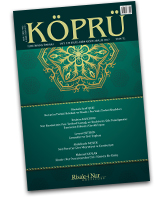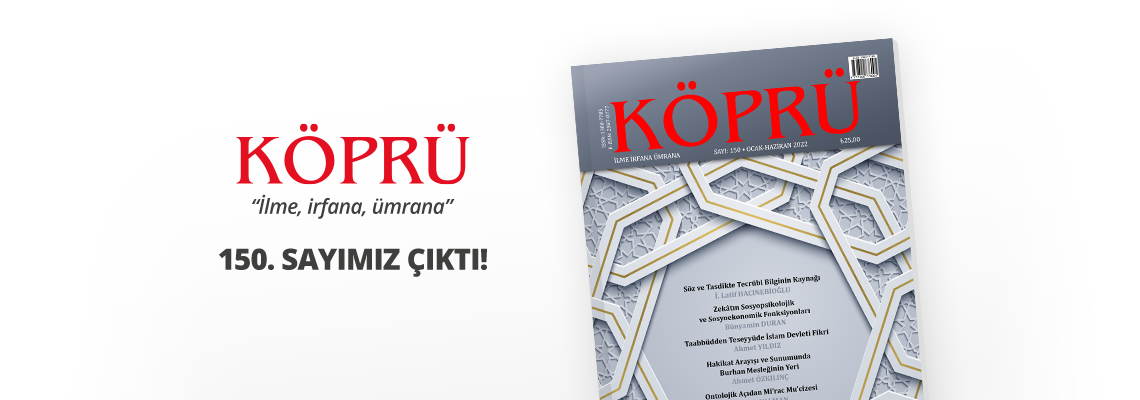Köprü Anasayfa

Eylül-Aralık 2017
"Köprü" 138. Sayı
-
Cemaatler ve Sivil Toplum
Community and Civil Society
Abbas Levent Ertekin
Psikolog-Sosyolog, MEB
Köprü • Sayı 138 • Eylül-Ekim-Kasım-Aralık 2017 • ISSN: 1300-7785 • ss 51-71
Öz
Cemaat ve sivil toplum kavramları Türkiye’nin son yarım yüzyılında literatürüne giren kavramlar olarak karşımıza çıkmaktadır. Çok partili demokratik hayata geçişle ulus devletin dayatması laiklik, sekülerizm ve resmî din kuşatması altındaki zincirler gevşemiş, ülke sivil din kavramını hürriyet ortamında yaşamaya başlamıştır.
Osmanlı mirası üzerinde yükselen Cumhuriyetin ajandasında din yoktur. Siyasi otorite dizginleri ele aldığı İkinci Meclisten itibaren cemaat türü yapılarla mesafeli durur. Dindarların devletle, siyasetle ilgili düşüncelerini ötekileştirir. Cemaat ve tarikatların varlıklarını kendi varlığını tehdit eden siyasî muhalefetin odağı görür. Bunun bugün bile tartışılan “Şeyh Said”, ”Dersim”, ”Menemen” ve ”İzmir Suikastı” gibi hala üzerlerinde sis perdesi aralanmamış uluslararası işbirliği üzerinde durulan argümanlar ve olaylarla “Şeriat!”, “İrtica!”, “Teokratik devlet!” etiketleriyle cemaat ve tarikatlar üzerinde baskı kurulur ve algı operasyonları yapılır.
1924 sonrası yaşananlara karşı çok az kitle hariç tutulmak kaydıyla cemaat ve tarikatlar devletçi ve merkeziyetçi yapılarını korurlar. Devleti kutsayan mantaliteye göre, “devlet yurt dışı uzantıları yardımıyla ele geçirilmiştir. Öyleyse bu ele geçirilen yapı temizlenmeli aslî yapısına yeniden kavuşturulmalıdır.” Cemaatlerin bu siyasal İslam temelini oluşturan mantalitesinin istisnası Risale-i Nur hareketidir. Birçok cemaat araç ile amacın birbirinin yerine ikamesiyle ticaret, finansla tanışmış; kurumsal yapı- dan uzakta şekillenen cemaat giderek siyasetin kontrolüne resmî yapısıyla girmiştir. Bediüzzaman Said Nursi orijinli Risale-i Nur hareketi resmî siyasî yapıdan uzak durmayı tercih ederken, tek parti döneminde de çok ağır bedeller ödemesine rağmen sivil itaatsizlik hakkını kullanmıştır. Risale-i Nur ana çizgisinde hareket tarzı, siyasal İslam’a mesafeli durmuş ve imanın bireyin hayatına yansıması üzerine kurgulanmıştır.
Anahtar Kelimeler
Gönüllülük, modernizm, postmodernizm, sekülerizm, sivil itaatsizlik, sivil toplum, sosyoloji, ticaret
Abstract
The concepts of “community” and “civil society” integrated to literature of Turkey in the past fifty years. By the help of the transition to multi-party democratic system, the religious life which is imposed by the state in a secular manner has started to turn into a more civil one. People started to experience their religion in a more tranquil way owing to acquisitions in freedom. The legacy of Ottoman State, Turkish Republic, did not include religion to her agenda. Once the political control was taken over, the Second Assembly of the Republic had been ill-disposed towards religious communities. The Republic alienated the thoughts of religious people about the state and politics. As a matter of fact, these communities were seen as opponents and as a threat to regime. We still witness the negative effects of anti-religious propaganda of the state when we look at the cases of “Sheikh Said”, “Dersim”, “Menemen” and “Izmir Assassination Attempt”. Although the real actors and causes of these events have not revealed, religious people or communities somehow have seen as interlinked with these events. By this mentality, the state exercises power over religious community by using sloganized words such as “Reactionism” and “Theocratic State”. After 1924, religious communities kept their statist structure except of few exceptions. Their main approach could be characterized as follows: “The state is taken over by external forces and controlled by the channels of these powers. The solution yields in removing these links and turning the state into its original position”. The exception of this approach which facilitates the idea of political Islam is the Risale-i Nur Movement. This idea caused a substitution of means and ends. Over time, when these communities get an opportunity in commercial and financial sectors, they were easily controlled by the political power of their time. The Risale-i Nur movement has managed keep its distance with such political powers and used the method of civil disobedience when faced negative practices of state against Muslims as in one-party era. The mainstream Risale-i Nur movement criticized the inclusion of politics in religious matters and promoted the idea of letting people to live their religious life and practicing it in their social life.
Key Words
Civil disobedience, civil society, commerce, modernism, postmodernism, secularism, sociology, volunteerism.
-
Editörden
Mehmet Kaplan
Yazıyı okumak için tıklayınız... -
Kur’an’ın Tevhid Hakikati ve Risale-i Nur’daki Tevhid Risaleleri
Mustafa Said İşeri
Yazıyı okumak için tıklayınız... -
Nur Hareketinin Yeni Tarihsel Kavşağı ve Risalelerin Kök Paradigmalar Üzerinden Kitlesini Sürekli İnşası
İbrahim Kaygusuz
Yazıyı okumak için tıklayınız... -
Cemaatler ve Sivil Toplum
Abbas Levent Ertekin
Yazıyı okumak için tıklayınız... -
Said Nursi’ye Göre Meşrutiyet ve Cumhuriyet
Abdulkadir Menek
Yazıyı okumak için tıklayınız... -
Risale-i Nur Penceresinden Ehl-i Sünnete Bir Bakış
Mahmut Kaplan
Yazıyı okumak için tıklayınız... -
Irkçılığın Reçetesi: Tevhid Eksenli Bilim Eğitimi ve Din
Atilla Yargıcı
Yazıyı okumak için tıklayınız... -
İhlas
Kaplan Üstüner
Yazıyı okumak için tıklayınız... -
İç Kanamanın Anlamı
Taha Çağlaroğlu
Yazıyı okumak için tıklayınız... -
Cemaat Nedir, Ne Değildir?
Levent Bilgi
Yazıyı okumak için tıklayınız... -
Risale-i Nur'dan Derleme
Bediüzzaman Said Nursi
Yazıyı okumak için tıklayınız...
